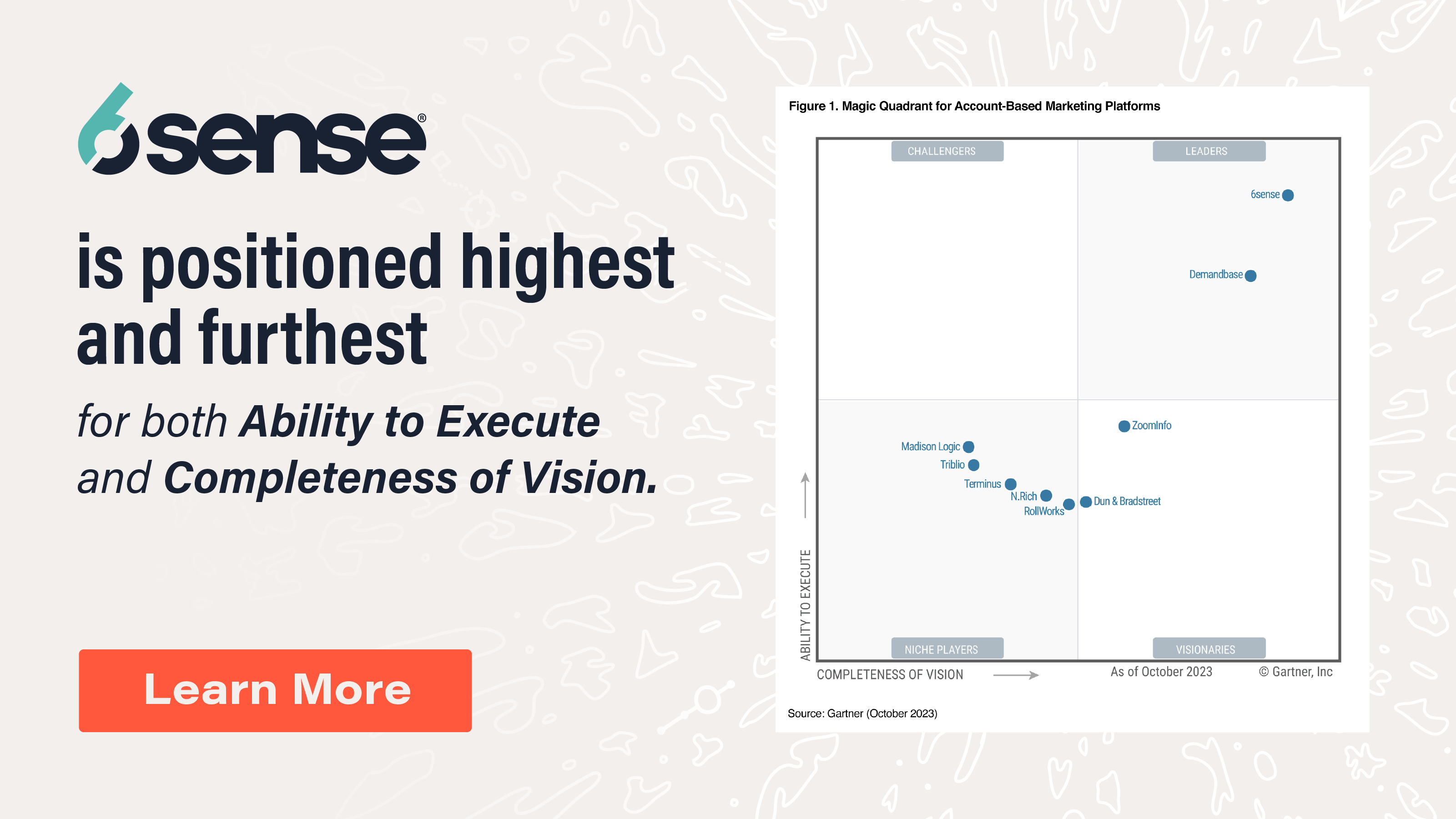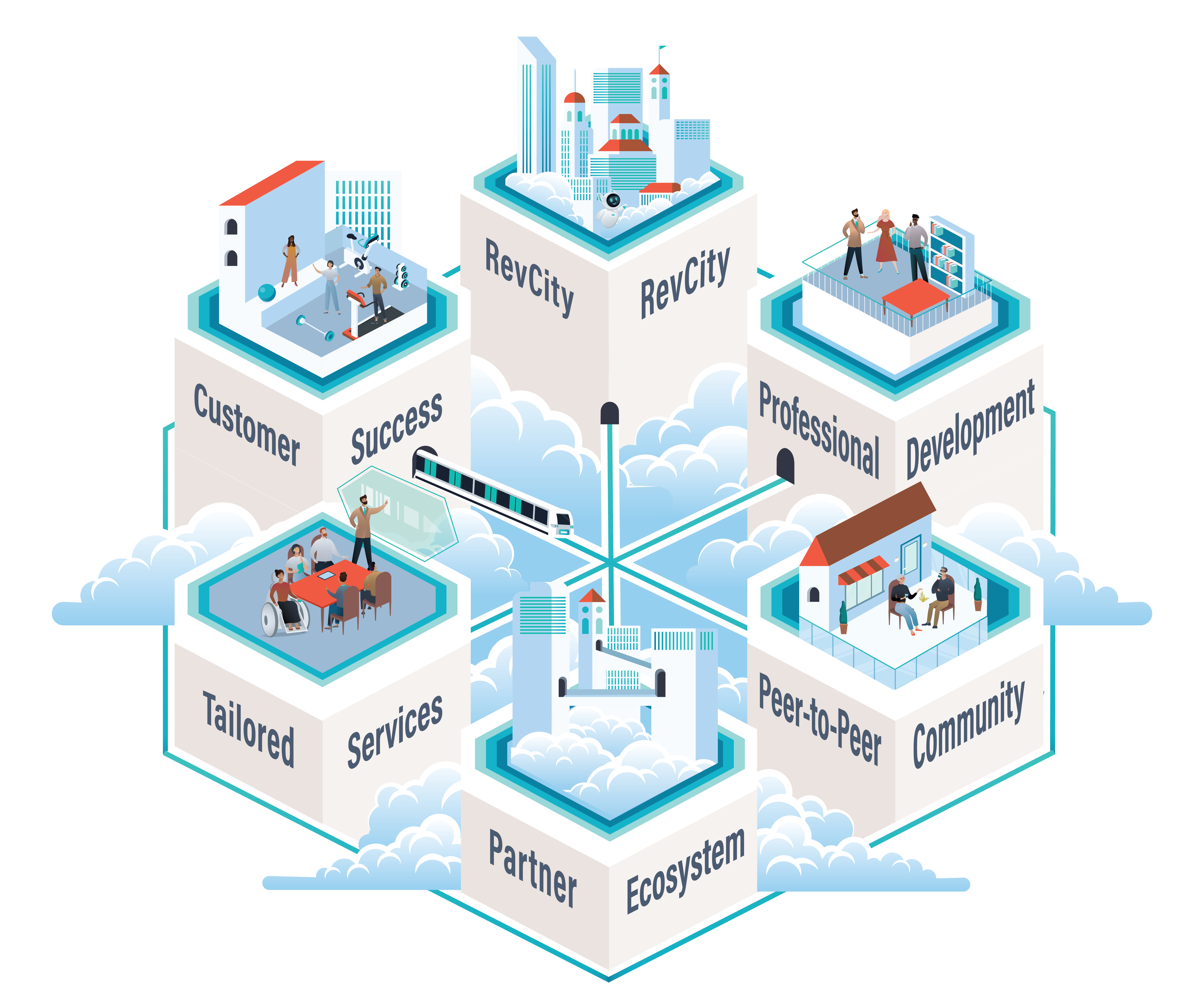Over 70% of workers are going into the office full-time or on a hybrid basis. As debates continue to swirl around returning to the office, hybrid, and fully remote set-ups, 6sense wanted to learn how B2B marketers’ work arrangement might affect their pay.
Our recent report, How Much are Marketers Making, provides a detailed look into the salaries of marketers in six B2B industries.
One of the big findings in this report was that marketers working remotely appear to be earning lower total compensation than those working in-person or hybrid roles.
This finding begged the question: Do remote positions earn less overall?
Because of the intense interest around the shifting nature of work — and especially where work is done — we dove into our findings to answer the question above.
We hope our findings can help B2B marketers better understand the labor market and how their decisions can affect their pay.
The Data Behind the Remote Work Penalty
A first glance at the data suggests that a pay gap between remote marketers and their office-based or hybrid peers emerges at the management level and above (see chart below).
We call this reduction in pay for remote work “The Remote Work Penalty.”

In the chart below you’ll notice that not only do remote workers appear to be paid less than others, they are also less satisfied with their pay.

With both an observable and perceived disparity in pay between remote workers and their peers, our team faced several questions to answer:
- Is this lower compensation because of a worker’s remote status — that is, could that status be seen as a standalone benefit that offsets the lower pay? Or,
- Are there other factors that can explain what appears to be a penalty associated with remote work?
We took a closer look.
Are All Aspects of Compensation Affected?
To see if there really is a Remote Work Penalty, we first considered each aspect of annual compensation (base salary, bonus, and equity) individually. What quickly surfaced is that the lower average total compensation seen for remote workers is driven by smaller bonuses. That is, there are no statistically reliable differences in the base salary and value of equity offered to B2B marketers based on work arrangement (see chart 1 and 2 below). Rather, the discrepancy arises when it comes to bonuses (see chart 3 of 3 below).

Chart 1 of 3 in series
There are no statistically reliable differences in the average base salaries across the three work arrangements. The teal, dark blue, and grey dots in the chart above represent the average base salary per work arrangement and the vertical bars extending either side of the dots represent the range of salaries we’d expect to find 95% of the time if we surveyed a new but similar set of marketers (the confidence interval). The horizontal dashed lines show us that the confidence interval for remote worker salaries overlaps the confidence intervals for in-person and hybrid workers. This means that if we surveyed a new but similar set of marketers their base salaries would be expected to fall within a similar range of one another. This means that the subtle differences depicted in this chart are not real differences we would see in the broader population of marketers. Thus, we conclude that the base salaries of remote, in-person, and hybrid marketers are not different.

Chart 2 of 3 in series
As with salary, there were no statistically reliable differences in the average value of equity across the three work arrangements. While the exact averages we observed in our sample differed, we cannot conclude that a new sample would differ in the same way.

Chart 3 of 3 in series
In contrast, we did find that remote workers earned reliably lower bonuses. While these differences may not appear large, we would expect to see them repeated if we surveyed the same or similar audience again.
The ‘Tech’ Factor: Differences Between Industries
We have seen so far that overall compensation is lower for remote employees, and that the difference is due to reliably lower bonus payouts. To further understand this, we looked at whether remote workers tended to differ in other ways from their hybrid or in-person peers, and whether these differences might be driving the lower bonus payout.
In our survey, Tech & Software employees were much more likely to be remote than employees in other industries.
And as we observed in our full compensation report, tech companies generally offer less in total compensation compared to companies in other industries, such as Manufacturing and Business Services (see the second chart below).

Chart 1 of 2 in series

Chart 2 of 2 in series
The ‘Financial Performance’ Factor: The Effects of a Slowing Economy
Following the finding that tech is among the industries that are currently paying out less in compensation, we considered the impact of the B2B economy.
We asked respondents to rate the financial performance of their organizations over the past year on a scale from “Well Below Expectations” to “Well Above Expectations.”
The tech and software industry was the only industry to indicate their organizations generally “met financial expectations” (see chart below). Respondents from the rest of the industries surveyed indicated their companies exceeded expectations. Hence, tech companies have not performed as well as companies in other industries over the past year, according to our respondents.

Survey Question: How did your organization perform financially over the past year from “well below expectations” to “well above expectations”?
Furthermore, we found a reliable correlation between the financial performance of organizations and the compensation they offer. A one-point difference in the financial performance of an organization (e.g., from “met expectations” to “exceeded expectations”) was associated with an average $13,000 boost in compensation.
Not surprisingly, the better a company performs financially, the more compensation their workers receive, and that is largely due to bonus payouts.
The tech industry did not perform as well as companies in other industries and has one of the lowest yearly average bonuses (see chart below).

Taking into account…
- The fact that a higher proportion of tech workers are remote, and
- Tech companies are not performing as well financially as others
- Financial performance influences compensation, especially bonus compensation
- The fact that tech companies are paying out smaller bonuses
…it turns out that what may have appeared to be a Remote Work Penalty is actually a reflection of the current state of the tech industry, or rather a “Tech Marketer Penalty.”
Tying It All Together
Taking into account the factors discussed above, it becomes apparent that what initially seemed like a “Remote Work Penalty” is really a Tech Work Penalty”.
Remote-working marketers can be reassured that the potential disparity in compensation is not attributable to their remote work status itself.
Our findings, however, can serve as critical insights for those workers looking for more clarity on which roles or industries offer more compensation — and why.
Appendix
Methods
Sample and Participants
A total of 656 respondents participated in this survey. The respondents consisted of B2B marketing professionals spanning a variety of industries, marketing disciplines and organizational levels from individual contributors to Chief Market Officers (CMOs).
Experience
When it comes to marketing experience, 43% of the participants reported having four to five years of experience. The remaining portion of our sample was fairly evenly distributed among marketers with less than a year of experience, one to two years, two to three years, and three to four years of experience.
Education
The sample represented a range of education levels, with 8% holding a high school diploma, 11% having an associates degree, 55% holding a bachelor’s degree, and 26% having a master’s degree.
Work Modalities
Among the respondents, 35% were remote workers, 20% worked in-person, and 45% had a hybrid work arrangement.
Company Funding
The sample included respondents from companies with diverse funding types. Approximately 21% of the companies were private equity (PE)-backed, 20% were venture capital (VC)-backed, 36% were privately funded, and 22% were publicly funded.
A Note on Our Analysis
Total Annual Compensation
To provide a comprehensive understanding of our respondents’ earnings, we collected information on their base salaries, annual bonus percentages, and whether they received equity (shares of ownership) as a part of their compensation. For participants who receive equity, we asked them to disclose the total value of their equity and the vesting period — the expected time it will take for it to become realized.
To calculate the annualized value of equity, we divided the total expected value of their equity by the length in years of the vesting period. This annualized equity value was then included in the calculation of their total annual compensation, along with annual base salary and annual bonus percentage.
It’s important to note that the actual realization of equity varies widely for reasons that are largely beyond an employee’s control. However, for the purpose of reporting “total annual compensation,” we treated the equity as if it became realized at a consistent rate on an annual basis. This approach allows us to present a comprehensive measure of earnings that incorporates the potential value of equity over time.
Statistical Reporting
| Finding | Statistical Test | Statistic | Significance Level | Effect Size | Sample Size |
|---|---|---|---|---|---|
| Those who work remote jobs report that their companies had lower financial performance over the past year than those who work in-person or hybrid jobs. | ANOVA | F=17.171 | p<.001 | 0.049 | 668 |
| Those who work for Technology companies tended to report lower company financial performance over the past year than those in other industries. | ANOVA | p=.04 | 0.017 | 668 | |
| Those working hybrid or in-person jobs tend to make more in base salary than those who work from home. | ANOVA | F=3.387 | p=0.034 | 0.010 | 668 |
| Base salary fluctuates by the financial performance of employing organizations. | ANOVA | F=7.694 | p<.001 | 0.044 | 668 |
| Financial Services and Manufacturing offer higher total compensation (salary, bonus, and equity) on average than Tech & Software, Professional Services, and Business Services. | ANOVA | F=7.345 | p<.001 | 0.053 | 666 |
| On its own, an organization’s fiscal health is generally associated with an average $13,000 boost in compensation per reported level of financial performance. | Regression Analysis | F=15.178 | p<.001 | 0.531 | 432 |
| Tech companies pay out smaller bonuses than Financial Services, Manufacturing, Professional Services, and Business Services. | ANOVA | F=4.57 | p<.001 | 0.034 | 649 |




